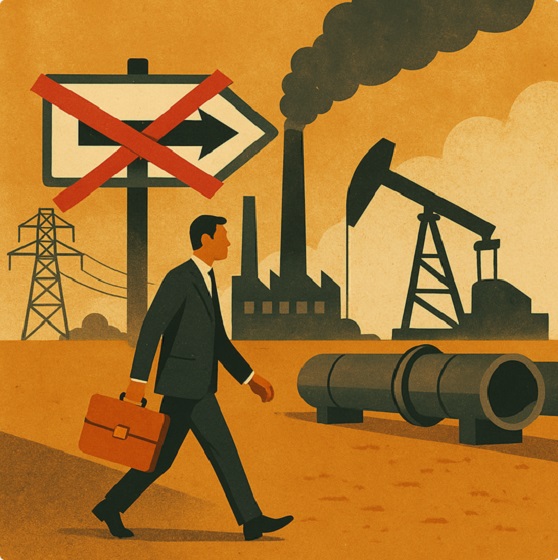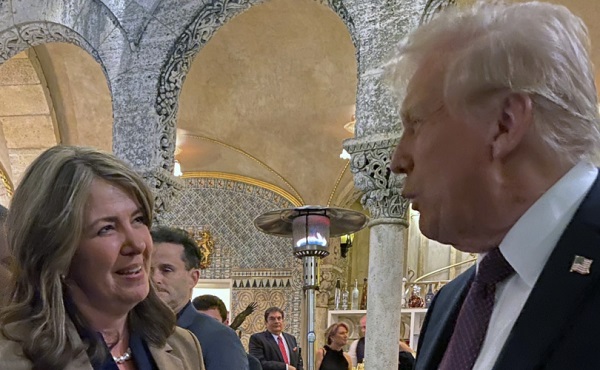Frontier Centre for Public Policy
Freedom Takes A Back Seat To Bureaucratic Convenience

From the Frontier Centre for Public Policy
The new pandemic-style rules aren’t about stopping forest fires. They’re about managing risk to thin public services. The fire season will end. But unless the logic behind these bans is rejected, the season for restrictions will not.
When Nova Scotia Premier Tim Houston banned walking in the woods during forestfire season, the justification was simple: safety. Soon after, New Brunswick’s Susan Holt followed his lead.
But when Holt defended the ban publicly, she said something revealing—and troubling.
It wasn’t about fires at all.
“Me going for a walk in the woods is gonna cause a fire. I can understand why people, uh, think that that’s, that’s. That’s ridiculous. But the reality is, it’s not that you might cause a fire, it’s that if you’re out there walking in the woods and you break your leg, we’re not gonna come and get you because we have emergency responders that are out focused on a fire … And if you take your boat out fishing … and you capsize, we’re not gonna be able to come and help you out because our first responders are focused on an immediate and serious threat … it’s the possibility of diverting emergency resources away from where they are really needed.”
Holt’s explanation makes one thing clear: this is not a fire-prevention policy. It’s a restriction on movement designed to protect the system from hypothetical inconvenience.
You may not be injured, and you may not cause any trouble at all, but if you could, and if the government’s resources are busy elsewhere, you can be told to stay home.
The logic is instantly familiar. It’s the same reasoning used during COVID lockdowns. Back then, the danger was not that you, specifically, were sick, but that you might be—and that your illness might contribute to hospital strain. “Flatten the curve” was about protecting system capacity, not eliminating disease.
In short, the forest fire bans recycle the same logic—just in a new setting. They make the public responsible for the state’s operational shortages. Scarcity is managed not by increasing capacity—more firefighters, more rescue crews—but by reducing the public’s freedom to create demand.
It’s worth spelling out the underlying assumptions.
First, the state assumes the right to manage your risk-taking. If your actions could, in theory, lead to a call for help at an inconvenient time, the state may prohibit them. This is an inversion of the citizen-government relationship: your life must adjust to the bureaucracy’s needs, not the other way around.
Second, it assumes that a shortage of services is your problem to accommodate. Instead of fixing the shortage, the government narrows the range of activities you are allowed to pursue.
Finally, it normalizes restrictions based on hypothetical harm. No incident need occur. The mere possibility is enough. That principle, once accepted, has no natural limit—because all human activity carries possible risk.
These assumptions, once accepted, don’t remain isolated.
This is how a pandemic-era mindset migrates into other domains. Once you accept that liberty can be suspended for the sake of “system protection,” the list of triggers grows: forest fire season, peak flu season, snowstorms, police shortages, even energy constraints. The extraordinary becomes ordinary, and the temporary becomes policy.
Politically, the appeal is obvious. Limiting freedom is easier than making tough decisions about resources and figuring out efficiencies. Telling citizens they cannot ski in winter because hospitals are busy is cheaper than staffing those hospitals to handle flu patients and broken legs. Restricting public gatherings because police are committed elsewhere is easier than efficiently allocating officers. Framing it as care, “for your safety,” softens the edge and keeps pushback low.
But it is a profound change in how governments understand their role.
In the traditional view, the state exists to safeguard liberty and provide the means for citizens to live freely despite risk. In this new model, citizens must live cautiously to ensure the state’s ability to function without strain. The system becomes the priority.
Some will dismiss this as a passing irritation, unique to the fire season. But the pandemic proved how quickly “temporary” restrictions can reappear in new forms. The Nova Scotia and New Brunswick bans show that COVID’s logic has been internalized by governments across the political spectrum, including those that identify as conservative.
The problem is not that governments sometimes need emergency powers. The problem is that the threshold for using them now appears to include the prospect of inconvenience to the system.
It is a shift from protecting the public in emergencies to protecting the bureaucracy from strain.
And the cost is not abstract.
Freedom of movement is not a minor liberty. It is a baseline for everything else—for work, for association, for daily life. If it can be revoked because you might twist your ankle while first responders are busy, it can be revoked for almost anything.
The fire season will end. But unless the logic behind these bans is rejected, the season for restrictions will not.
The next emergency—real or perceived—will bring the same refrain: stay home, for the sake of the system. And each time, the public will be expected to accept that liberty is conditional, rationed out only when the government finds it convenient.
That is not the Canadian tradition. That is not how free societies work. And it will only stop when citizens insist that the system exists for them—not the other way around.
Marco Navarro-Genie is vice-president of research at the Frontier Centre for Public Policy and co-author, with Barry Cooper, of Canada’s COVID: The Story of a Pandemic Moral Panic (2023).
Business
Canada Is Sleepwalking Into A Cartel-Driven Security Crisis

From the Frontier Centre for Public Policy
The U.S. is escalating its fight against drug cartels by treating them like terrorist organizations, while Canada risks becoming a safe haven if it fails to act. Cartels already exploit Canadian banks, real estate, and trade, posing national security threats beyond drugs. In this commentary, Frontier Centre senior fellow Scott McGregor urges Canada to tighten ownership laws, strengthen enforcement, and apply terrorism financing tools—otherwise, it will become the weak link vulnerable to cartel infiltration and corruption.
The U.S. is getting serious about drug cartels. If Canada doesn’t step up, we risk becoming their next base of operations
According to a recent New York Times report, U.S. President Donald Trump has given the Pentagon the green light to target Latin American drug cartels. Not “target” in the metaphorical sense—this is the real thing. Drones. Intelligence ops. Boots, if not yet on the ground, then certainly in the briefing rooms.
This isn’t just another law-and-order flex. It’s a clear signal that cartels are no longer being treated like street thugs with fast cars and gold-plated pistols. The U.S. is starting to treat them as what they’ve become: strategic actors capable of hollowing out nations through violence, economic sabotage and political manipulation.
Canada, take note. These cartels aren’t lurking just south of the Rio Grande. They’re here—moving narcotics through our ports, washing dirty money through casinos and real estate, and slipping illicit profits into the bloodstream of our legitimate businesses. The same loopholes that let hostile states meddle in our economy—opaque ownership laws, sluggish enforcement, paper-thin oversight—are a buffet for criminal networks.
The U.S. move to label cartels as foreign terrorist organizations isn’t just semantics. It unlocks serious tools: sanctions, asset freezes, intelligence collection, and expanded interagency coordination. And yes, it will inevitably reshape how American agencies engage with Canadian police, prosecutors and financial watchdogs. Whether we’re ready or not.
Our private sector, already lumbering under the alphabet soup of the Proceeds of Crime (Money Laundering) and Terrorist Financing Act, if you’re into that sort of thing, will now face higher expectations. The law technically requires banks, real estate firms, casinos and others to flag dodgy transactions. But reality hasn’t lived up to regulation. Just ask TD Bank, which somehow let billions in suspected drug money pass through its accounts like it was business as usual.
Now, with U.S. regulators treating some cartels like terror networks, those Canadian reporting obligations take on a whole new urgency. Vague links to shady partners won’t be brushed aside—they’ll be flagged, frozen and maybe prosecuted. Transactions won’t just be scrutinized for origin—they’ll be examined for intent, connection and risk exposure.
And if you think this only applies to bags of cash under the table, think again. Trade-based laundering—fudged invoices, over- or underpriced exports, corporate shell games—is very much in the crosshairs. So is service-based laundering: professional firms, logistics handlers, consultants. If it moves, it can be used. And if it moves dirty money, it’s fair game.
For businesses with Latin American partners or operations in high-risk sectors—agriculture, commodities, shipping, construction—the rules have changed. Every client, every partner, every middleman becomes a compliance risk. Insurers and investors are already sharpening their pencils. If you thought due diligence was annoying before, just wait.
But the private sector won’t be the only one feeling the heat. Canadian law enforcement can’t afford to lag behind. If the U.S. is reaching for terrorism laws to take down cartel operations, Canada can’t keep leaning on an outdated “organized crime” framework better suited to The Sopranos reruns than transnational hybrid conflict.
Integrated enforcement units will need more than pep talks—they’ll need authority, funding and legal backing to go after not just cartel foot soldiers, but the enablers hiding in plain sight: financial fixers, trade brokers and regulatory sleepers.
It’s time to revisit whether our terrorism financing laws can apply to cartels that, let’s face it, look and act an awful lot like geopolitical insurgents. If they meet the Criminal Code’s thresholds, why aren’t they being treated accordingly?
Because this isn’t just about drugs. It’s about hybrid warfare.
Cartels are no longer just violent criminal enterprises. They’ve become destabilizing forces—sometimes aligned with hostile regimes, always exploiting weak institutions. Take Venezuela’s Cartel de los Soles. It’s allegedly run by senior government officials. That’s not just a crime ring. That’s a criminal state actor.
When such networks pass through Canada, they don’t just bring drugs. They bring the risk of corruption, economic distortion and political interference. In short: they’re a national security threat.
And here’s the kicker: if Canada doesn’t match the U.S. posture, we become the soft underbelly. Cartels will exploit every gap between Washington’s crackdown and Ottawa’s inertia. Even if Canada doesn’t change a thing, the private sector won’t get a pass. U.S. regulators don’t particularly care what Parliament does—they care about risk exposure. And they will act accordingly.
The U.S. designation confirms what many in intelligence and enforcement have long known: the cartels use the same toolkit as hostile states: illicit finance, economic disruption and market infiltration. That makes them more than a policing challenge. They are a test of national resilience.
Canada’s response needs to be sharp, strategic and immediate. That means tightening ownership laws, expanding the operational muscle of FINTRAC—the federal agency that tracks suspicious financial transactions and combats money laundering—and properly resourcing joint enforcement teams. Above all, we must stop treating compliance as a box-checking exercise and start treating it as the security tool it was meant to be.
Washington’s message couldn’t be clearer. If Canada stays on cruise control, the cartels will set up shop here—and we’ll be the ones footing the bill in corrupted institutions, compromised markets and communities left to deal with the fallout.
Hybrid threats don’t wait for committee reports. They move fast, adapt quickly and embed deeply. So should we.
Scott McGregor is an intelligence consultant and co-author of The Mosaic Effect. He is a senior fellow at the Council on Countering Hybrid Warfare and writes here for the Frontier Centre for Public Policy.
Business
Canada Is Suffocating Its Future One Policy At A Time

From the Frontier Centre for Public Policy
By David Leis
While wealth-generating industries are hindered, subsidies flow to politically favored projects, leaving capital fleeing and IPO activity collapsing. Canada’s prosperity is at risk unless leaders cut red tape, open trade, reform taxes, and support industries that create real growth.
Red tape, capital flight and anti-growth policies are draining Canada’s economy. Our prosperity is at risk if leaders don’t act now
Canada is slowly dismantling the foundations of its own prosperity. Instead of unleashing our strengths, we’ve layered on regulation, red tape and ideology that repel investment and weaken our economy—one policy at a time.
This isn’t hyperbole. For over a decade, Canada’s per capita gross domestic product (GDP) has stagnated. Our productivity has fallen behind global peers. Young people are leaving the country, investment is drying up and even our own entrepreneurs are taking their capital—and their ideas—elsewhere.
We’re not failing because of a lack of resources. Quite the opposite. We have everything: land, minerals, oil, gas, water, agriculture and human talent. But whether it’s energy infrastructure, mining projects or manufacturing capacity, the answer from Ottawa is almost always “no”—thanks to layers of red tape, regulation and risk-averse policy.
Bloated bureaucracy, regulatory overreach and ideologically driven legislation—such as Bill C-69, which made it far harder to approve major energy and infrastructure projects, and Bill C-5, which gives Ottawa sweeping veto power in the name of reconciliation—have created an environment so hostile to investment that many firms no longer even try.
One example illustrates this clearly. The Trans Mountain pipeline—a major oil pipeline intended to carry Alberta crude to Pacific markets—was crippled by government takeover and quintupled in cost. We’re now told it might expand further—if regulators allow it.
Meanwhile, 15 per cent of the pipeline sits idle. This portion, set aside for short-term or on-demand shipments—known as spot capacity—is burdened by toll rates so high that shippers can’t justify using it. These prohibitively high fees, meant to recover the ballooning construction costs, have effectively priced out would-be users, leaving critical infrastructure underused and investment returns diminished.
This isn’t just bad economics. It directly weakens the very foundation of Canadian life—good jobs, innovation and upward mobility. Without strong investment in productive sectors like energy, mining and agriculture, we lose the wealth and opportunity that support our way of life.
Yet we continue to subsidize politically fashionable projects such as pumping billions into electric vehicle plants while punishing the industries that pay the bills.
And the message to innovators is just as bleak: new companies are staying private, avoiding public markets like the Toronto Stock Exchange, where new listings—known as IPOs—have all but disappeared. Bloomberg has reported just one large IPO in Canada so far this year. That’s unthinkable in a country that once marketed itself as a global financial hub. It’s part of a deeper problem: productivity is flatlining, and capital is fleeing, with hundreds of billions of dollars quietly leaving Canada in recent years.
This is why the average Canadian feels poorer—at the grocery store, in job prospects and when trying to save for a home. When investment dries up, so does the future. Our middle class, once the backbone of this country, is being squeezed from all sides: by inflation, stagnating wages, rising taxes and the shrinking availability of meaningful work.
Even our national identity is eroding. What kind of country punishes its wealth creators? What kind of government claims to support Indigenous partnerships while vetoing resource projects that offer Indigenous communities real economic independence? What kind of democracy penalizes companies for speaking openly about their environmental performance?
Canadians are starting to feel it. Young graduates are leaving. Parents are unsure how their kids will afford homes—or futures. We’re told this is the cost of progress. But the truth is simpler: we’re managing our decline.
There is another way. Open internal trade. Restore industrial freedom. Reform taxation to reward innovation and risk. End the obsession with slogans and deliver real-world results.
Canada still has every advantage for renewal. But it will take leadership willing to act. Canadians are ready. It’s time for our policies to catch up.
Renewal begins with the conviction that this country can thrive again—not in theory, not one day, but now. It begins with a government willing to say “yes” to building, producing, investing and competing. It begins with citizens who understand that prosperity is not permanent—it must be earned, protected and made possible by policy.
Without a vibrant economy, there is no middle class. And without a middle class, there is no Canada.
David Leis is President and CEO of the Frontier Centre for Public Policy and host of the Leaders on the Frontier podcast.
-

 Business1 day ago
Business1 day agoCanadians don’t just feel worse off—they actually are
-

 Censorship Industrial Complex1 day ago
Censorship Industrial Complex1 day agoComedy writer Graham Linehan arrested in UK for criticizing gender ideology on social media
-

 COVID-191 day ago
COVID-191 day agoHow effective were COVID vaccines really?
-

 Bruce Dowbiggin2 days ago
Bruce Dowbiggin2 days agoMitch Ado About Marner: Angry Toronto Fans Needed A Scapegoat
-

 Artificial Intelligence1 day ago
Artificial Intelligence1 day agoAI Drone ‘Swarms’ Unleashed On Ukraine Battlefields, Marking New Era Of Warfare
-

 COVID-191 day ago
COVID-191 day agoCanada issues nationwide warrant for Freedom Convoy protester seeking asylum in the US
-

 Health1 day ago
Health1 day agoRobert F. Kennedy Jr. wows to rebuild public trust in CDC
-

 Energy1 day ago
Energy1 day agoWaiting to Launch a New Oil Pipeline to the West Coast Until the Trans Mountain Reaches Full Capacity is a Bad Idea






